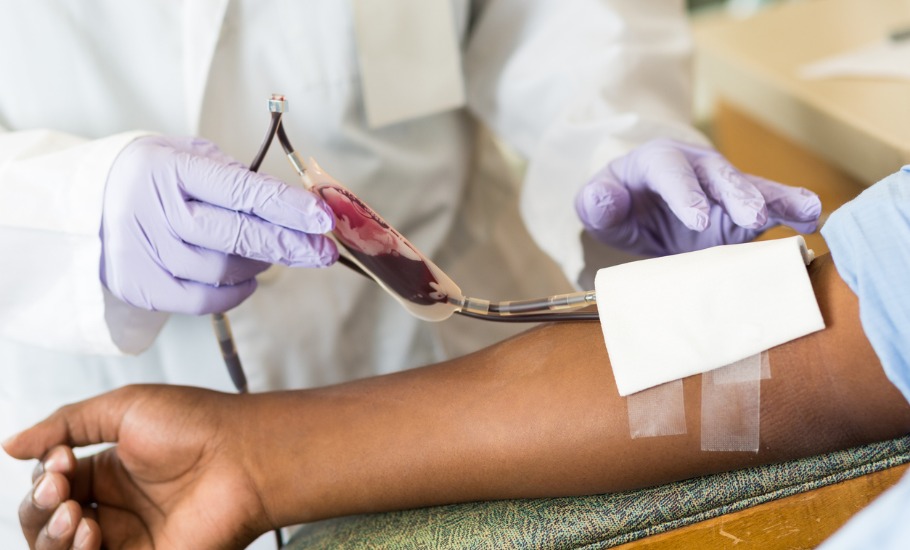
World Blood Donor Day: Giving blood is good for your health; find out why

While donating blood may initially seem daunting, it is actually a straightforward procedure that has the potential to save someone’s life. The benefits of donating blood are limitless for those in need.
As stated by the American Red Cross, a single donation has the ability to save up to three lives, and there is a constant demand for blood worldwide, with someone requiring it every two seconds.
Interestingly, donating blood not only benefits the recipients but also provides health advantages to the donors themselves, in addition to the inherent satisfaction of assisting others.
Also Read: World Blood Donor Day 2022: Recognising the act of solidarity that saves lives
Continue reading to discover the health benefits associated with donating blood and the underlying reasons behind them.
Donating blood offers several health benefits, which include:
Health check: Before donating blood, individuals undergo a thorough medical examination. This process includes testing for blood pressure, haemoglobin levels, infectious diseases like HIV and West Nile virus, and other health indicators. Regular screenings can help identify potential health issues and provide an opportunity for early intervention.
Reduced risk of heart disease: Regular blood donation is associated with a lower risk of cardiovascular diseases. Donating blood helps maintain optimal blood viscosity, reducing the risk of blood clot formation and subsequent cardiovascular complications.
Iron regulation: Blood donation can help regulate iron levels in the body. Excessive iron accumulation can lead to health problems such as liver diseases and an increased risk of heart attacks. Regular blood donation can help reduce iron overload in individuals at risk, promoting better overall health.
Increased blood cell production: After donating blood, the body replenishes the donated blood volume by producing new blood cells. This stimulates the bone marrow to produce fresh, healthy blood cells, enhancing the overall functioning of the body.
Improved mental well-being: The act of donating blood has been associated with positive psychological effects. It can provide a sense of purpose, satisfaction, and a feeling of making a difference in someone else’s life. These emotional benefits can contribute to improved mental well-being and a more positive outlook on life.
It is important to note that while these benefits exist, blood donation should be done voluntarily and for the sole purpose of helping others. Individuals considering blood donation should consult with healthcare professionals and adhere to the guidelines provided by blood donation organisations.
Also read: From delivery persons to blood donors: WB cops take on various roles
There are certain situations and conditions that may prevent individuals from giving blood initially or altogether. Here are some examples:
Anemia: Anemia, characterised by a deficiency in red blood cells or hemoglobin, can disqualify individuals from donating blood. Anemia is often caused by iron deficiency, and individuals with this condition should not donate blood.
Pre-menopause: Pre-menopausal women may face challenges in donating blood due to potential iron depletion and slightly lower blood counts. Taking oral iron supplements, under the guidance of a healthcare professional, may help qualify for blood donation.
Malaria-risk countries: Having travelled to or lived in a country with a risk of malaria may delay or restrict individuals from donating blood. Depending on the specific circumstances, there may be a waiting period before being eligible to donate.
Recent medications or vaccinations: Certain medications, such as antibiotics or blood thinners, and recent vaccinations, such as for chickenpox or measles, mumps, and rubella (MMR), may require a waiting period before individuals can donate blood. The length of the waiting period depends on the specific medication or vaccination received.
Also read: 15-day Raktdaan Amrit Mahotsav begins on PMs birthday, Mandaviya donates blood
It is essential to consider the frequency of blood donation to avoid the risk of iron deficiency. Donating blood too frequently can deplete iron levels in the body. However, blood donation guidelines allow for specific intervals between donations.
These guidelines typically include:
Whole blood donation: You can donate whole blood every 56 days, which allows for a maximum of six donations per year.
Platelet donation: If you are donating platelets, you can do so every seven days, allowing for a maximum of 24 donations per year. Platelets have a shorter shelf life and are needed more frequently for medical treatments.
Power red donation: Power Red donation involves using a machine to safely donate two units of red blood cells. This type of donation can be done every 112 days, allowing for a maximum of three donations per year.
Following these recommended intervals helps maintain healthy iron levels in the body and ensures that both the donor and the recipient’s well-being are prioritised. It is important to adhere to these guidelines and consult with healthcare professionals if there are any concerns regarding blood donation frequency.

